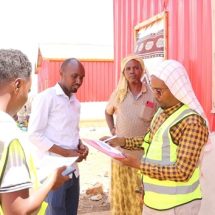ECA Press Release 166/2012: Addis Ababa, 11 October 2012 (ECA) – The Land Policy Initiative today launched the third in a series of studies to promote evidence-based land policies across the Continent.
According Ms Joan Kagwanja, Head of the Land Policy Initiative at the United Nations Economic Commission for Africa (ECA), the series of studies, associated reports and advocacy material will facilitate knowledge generation and dissemination that should promote policy formulation that is based on scientific evidence.
Speaking to ECA’s Information and Communication Services (ICS), Ms Kagwanja said that the studies will focus on mainstreaming land in strategies and programmes for Africa’s development, improving access to land and security of land rights for women in Africa, and large scale land based Investment in Africa
The first in the series, the inception workshop on Mainstreaming Land in Strategies and Programmes for Africa’s Development was held alongside the Joint Review and Planning Meeting of the NEPAD Planning and Coordination Agency on 7 October 2012.
Kagwanja said that the forum provided a unique opportunity for key stakeholders to share perspectives on how best to mainstream land in development strategies and programmes, especially as it was held just ahead of the CAADP (Comprehensive Africa Agriculture Development Programme) Business Meeting.
CAADP is the Comprehensive Africa Agriculture Development Programme that was established as part of NEPAD in 2003 and focuses on improving and promoting agriculture across Africa.
These stakeholders included senior staff members and representatives of the African Union Commission (AUC), NEPAD Planning and Coordinating Agency (NPCA), Regional Economic Communities (RECs), the Forum for Agricultural Research in Africa (FARA), and the International Food Policy Institute (IFPRI) as well as officials of the Land Policy Initiative.
On the occasion, Ms. Kagwanja revealed that mainstreaming land issues in Africa’s development is one of the eight objectives of the LPI plan. Hence, the Initiative will entail conducting a study that would provide recommendations on the entry points for addressing land-related challenges in the context of continent-wide programmes.












